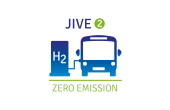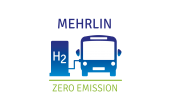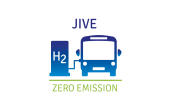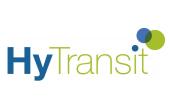Objectives/targets:
The overall objective of the JIVE initiatives are to advance the commercialisation of fuel cell buses through large-scale deployment of vehicles and infrastructure so that by the end of the project, fuel cell buses are commercially viable for bus operators to include in their fleets without subsidy, and that local and national governments feel empowered to regulate for zero emission propulsion for their public transport systems.
General objectives of the JIVE and JIVE 2 projects:
- Achieve a maximum price €625k-€650k for a standard fuel cell bus thanks to economies of scale – or lower
- Foster joint procurement processes, encourage manufacturers to develop and refine their fuel cell bus offers
- Validate large scale fleets in operation and encourage further uptake, showcasing that fuel cell buses represent a viable alternative for public transport authorities, offering the same operational flexibility as diesel buses but without the harmful tailpipe emissions
- Deploy largest hydrogen refuelling stations in Europe and operate them at near 100% reliability
- Demonstrate routes to achieve low cost renewable hydrogen
- Share data and best practice to support the adoption of the technology and provide evidence of the suitability of fuel cell buses for wider roll-out
Specific to JIVE2:
- Deploy 157 fuel cell buses across 12 cities
- Achieve a maximum price of €625k for a standard fuel cell bus
- Operate buses for at least three years / 150,000 km
- Validate large scale fleets in operation
- Enable new entrants to trial the technology
- Demonstrate routes to achieve low cost renewable hydrogen
- Stimulate further large scale uptake
Public deliverables
JIVE2 Fuelcellbus implementation plan - report on remaining barriers and proposed solutions (April 2025)
JIVE2 Fuelcellbus rollout in Sweden, developing pathways to post-JIVE deployment in Scandinavia (February 2025)
JIVE/JIVE2 The potential for hydrogen buses in Europe: results form the bulk analysis of passenger schedules: (July 2024)
JIVE/JIVE2 Operators guide to FCB deployment (July 2024)
JIVE/JIVE2 Best Practice Report (July 2024)
JIVE/JIVE2 report, lessons learnt from the joint procurement (May 2024)
JIVE 2 Lessons learnt from the 2nd Roadshow (March 2024)
JIVE 2 Lessons learnt from the 1st JIVE2 CEE Bus Roadshow (June 2023)
JIVE 2 Best Practice Information Bank Report 1 (Jan 2020)
Operators' guide to FCB deployment (Oct 2019)
Guidance for HRs consenting phase (Sept 2018)
Deployment sites:
The buses will be deployed across 12 European cities throughout France, Germany, Spain, the Netherlands and the UK. Some sites are indicated on the map below. Note that all specific deployment sites will be added once the project makes progress.

 In operation
In operation  Planned
Planned




